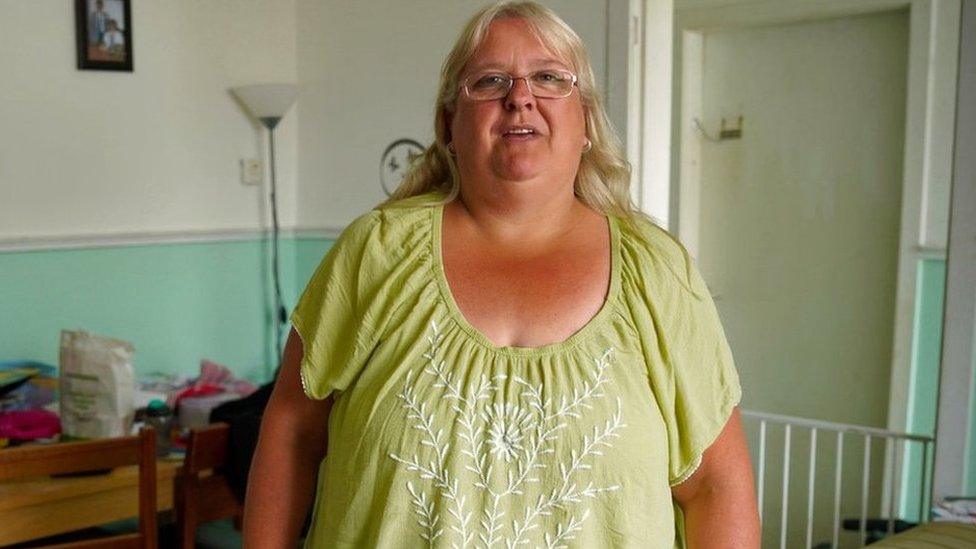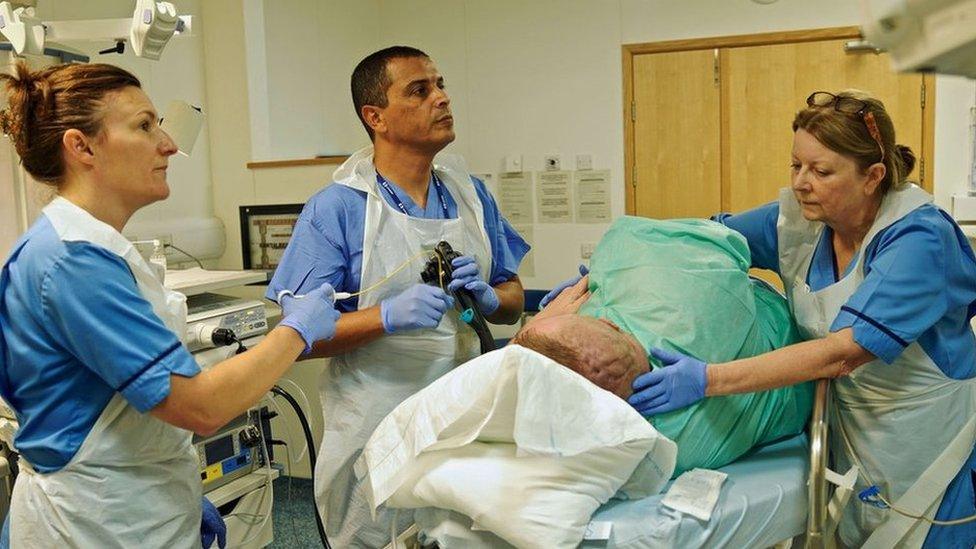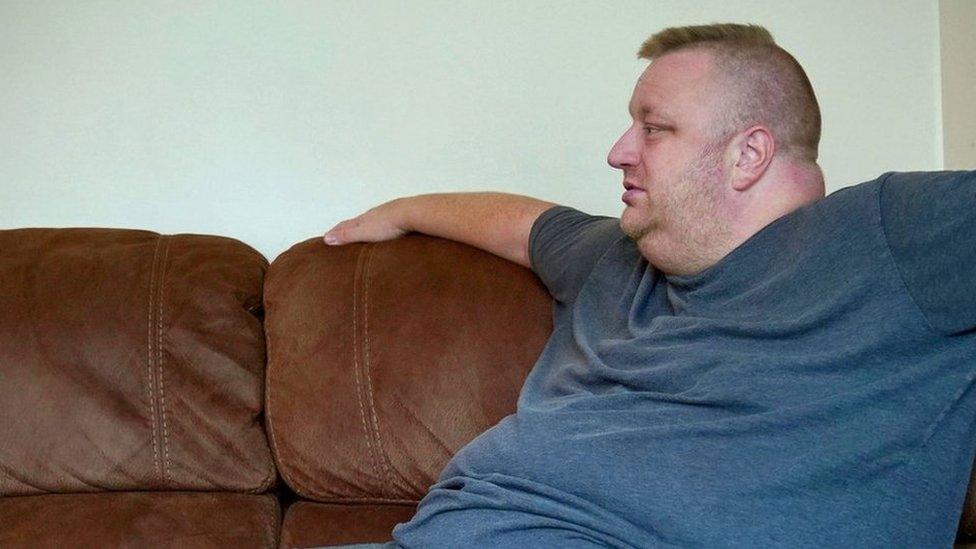The people shedding the fat through surgery
- Published

Alison pictured at the start of her weight loss journey
Alison is a self-confessed food addict who weighs 21st (133kg) and is considering drastic action to reduce her size.
She's had a bad day and that leads to her tucking into her favourite Chinese takeaway with her daughter and grand-daughter.
Alison knows she should not do it but today she feels defeated in her daily battle to eat healthily.
"I should not be eating it, I'm meant to be losing weight," she tells the BBC Scotland documentary Shedding the Fat.
"I've lost the fight with the devil.
"The devil won. The devil is a Chinese."
Highest levels of obesity
The struggle with an unhealthy diet is one which is replicated across the country.
Scotland has one of the highest levels of obesity in the world, with about 65% of the adult population classed as overweight with more than a million of them classed as obese.
This creates a strain on health services and can leads to premature death due to chronic conditions such as type 2 diabetes, hypertension and cardiovascular disease.
The two major lifestyle factors associated with the growth of obesity are lack of physical inactivity and poor diet.
Alison, who is 51 and lives in Ayrshire, says she wants to lose weight to be around to look after her daughter and her grandchildren.
"If I'm not here, who watches over them, who keeps an eye on them," she says.
Her desire to lose weight has led her to the doors of the bariatric unit at University Hospital Ayr.
It is one of the few specialist centres that performs surgery which helps those who need to lose weight.

Surgeon Majid Ali performs an endoscopy on Stephen in preparation for his weight loss surgery
The surgery reduces the size of the stomach so less food is eaten and digested.
This can be done by applying a gastric band, inserting a gastric balloon or creating a gastric sleeve to reduce stomach capacity.
In other operations the intestines can be bypassed to reduce absorption of food
The unit's clinical director of surgery and endoscopy is Majid Ali.
He has seen the damage caused to the inside of the body and warns of the toll of eating junk food.
He says: "Eating crisps is like trading hours of your life, you have to ask yourself: 'Is it worth it?'."
Last year, 192 bariatric operations were performed by NHS Scotland.
However, doctors say resources are limited and they need to target patients who will benefit most.
'Munchies'
Crucially, this means those who are committed to making lifestyle changes for the better.
"Surgery is only part of this journey, a lot of things have to change", says Mr Ali.
Bariatric surgery is not an easy option and there are risks associated with this type of surgery.
Extreme amounts of fat in the body can make it unsafe to administer a general anaesthetic.
Stephen, also from Ayrshire, has been told he needs to lose weight before he can be considered for surgery.
He weighs 26st (165kg) and has a body mass index (BMI) of 52, which is classed a morbidly obese.
A healthy BMI should be between 18.5 and 25.
His excess weight means he cannot yet be considered for the surgery that could reduce his weight and his diabetes.
Doctors want him to lose weight to show he is committed to changing his ways.
But a fondness for "munchies" of pizza or a kebab after a "sociable" drink at the weekend makes it hard.

Stephen prepares for surgery to cure his type 2 diabetes
Stephen says being diagnosed with diabetes has frightened him.
He says: "I've got so many health problems now and that's when I realised I've got to do something."
His wife Tina, who met Stephen in a fast food shop, is worried about his health.
She says: "I feel partly to blame for it. He wasn't as big when he moved in here."
During a consultation at the hospital, Mr Ali reviews his weight loss record over the previous months and concludes that Stephen isn't taking the process seriously.
The surgeon says emotional health has a part to play in maintaining a healthy weight.
Mr Ali says: "The patients I deal with usually have some psychological baggage - low self esteem, anxiety or depression.
"Bariatric surgery can give hope to people.
"It can increase the quality of their life, it can add years to their life and, for some, it can save their lives."
Slice of toast
In the weeks leading up to her operation, Alison ditched the takeaways to follow a strict 800 calorie-a-day diet.
She weighs portions of chicken, chooses the lowest calorie vegetable mix from her freezer and works out whether adding a spoonful of sauce will leave room for a slice of toast later in the day.
Her commitment pays off.
On the operating table Alison's stomach is reduced in size by 90%, about 25% of her intestines are also bypassed and the new smaller pouch will digest the much smaller portions of food.
'A new journey'
Ten months after her gastric bypass she is eight and a half stone (54kg) lighter and regaining her confidence.
Shopping for clothes is now a joy, she says.
Alison says: "I feel happier and healthier, the happier is still trying to catch up with the healthier.
"The one thing surgery has given me is freedom."
Stephen has shed about 13lbs (6kg) and hopes to have his gastric bypass before the end of the year.
"Then it's the start of a new journey," he says.
Shedding the Fat is on BBC One Scotland on Monday 26 November at 21:00 GMT.